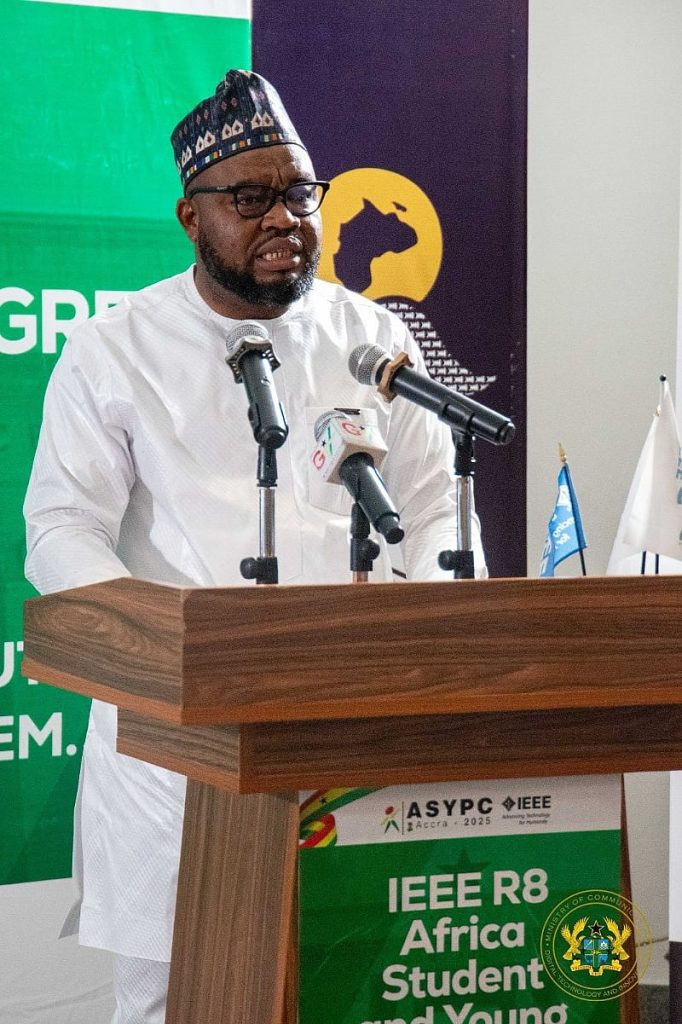The 2025 IEEE R8 Africa Students & Young Professionals Congress, held at the University of Professional Studies, Accra (UPSA), served as a pivotal platform for addressing the critical role of STEM education in empowering Africa’s future leaders. Mr. Mohammed Adams Sukparu, Ghana’s Deputy Minister for Communication, Digital Technology and Innovations, delivered a compelling keynote address emphasizing the congress’s theme, “Empowering Africa’s Future Leaders Through STEM,” as particularly relevant in the context of Africa’s development trajectory. He underscored the undeniable link between prioritizing STEM fields and achieving global innovation, economic growth, and sustainable development, positioning these disciplines as essential drivers of progress in the 21st century. Mr. Sukparu’s address highlighted the significance of the congress as a testament to collaboration, innovation, and the shared vision of nurturing the next generation of African leaders equipped to navigate the complexities of a rapidly evolving technological landscape.
The Deputy Minister’s remarks centered on Africa’s immense untapped potential, particularly its wealth of talent, creativity, and youthful energy. He stressed the urgent need to cultivate environments conducive to innovation and provide access to cutting-edge tools and knowledge. He specifically pointed to artificial intelligence, data science, blockchain, cloud computing, and cybersecurity as crucial areas of focus, recognizing them as foundational pillars of the Fourth Industrial Revolution. Mr. Sukparu emphasized the importance of Africa taking a leadership role in these transformative technologies, leveraging its demographic advantage and innovative spirit to shape a future driven by technological advancements. He argued that by investing in these critical areas, Africa can unlock its full potential and drive sustainable development across the continent.
Mr. Sukparu articulated Ghana’s Digital Vision, outlining the nation’s commitment to building a resilient and inclusive digital economy. This vision is underpinned by strategic investments in digital infrastructure, e-government services, fintech innovation, and ICT education. He highlighted ongoing initiatives, including the expansion of national broadband access and support for local tech startups. These efforts are aimed at bridging the digital divide and ensuring equitable access to technology and its benefits for all Ghanaians, regardless of their location or socio-economic background. He emphasized the importance of digital inclusion in fostering economic growth and empowering communities.
The Deputy Minister elaborated on the “bold components” of the Digital Ghana Agenda currently underway. These include expanding last-mile connectivity to bring internet access to even the most remote rural communities, further bridging the digital divide and connecting marginalized populations to the opportunities offered by the digital economy. He also highlighted the launch of a $1 billion Ghana-UAE Innovation and Technology Hub, designed to attract leading global technology companies to establish their African headquarters in Ghana. This initiative aims to foster a vibrant tech ecosystem, create high-skilled jobs, and position Ghana as a leading technology hub in Africa.
Mr. Sukparu acknowledged the Institute of Electrical and Electronics Engineers (IEEE) as a crucial global partner in driving technological advancement and professional development. He praised IEEE’s dedication to capacity building and global collaboration, recognizing the organization’s significant contributions to nurturing a skilled workforce capable of driving innovation and technological progress. He emphasized the importance of partnerships like these in fostering a global community of innovators and problem-solvers working together to address the challenges facing humanity.
In his concluding remarks, Mr. Sukparu delivered a powerful call to action to the students and young professionals participating in the congress. He urged them to actively engage in networking, innovation, and collaboration, emphasizing that the future of Africa rests squarely in their hands. He challenged them to embrace their roles as innovators, entrepreneurs, policymakers, and changemakers, empowered by STEM education to shape the continent’s destiny and drive sustainable development. He reminded them of their potential to create a brighter future for Africa, leveraging the power of technology and innovation to address the continent’s unique challenges and unlock its vast potential.


